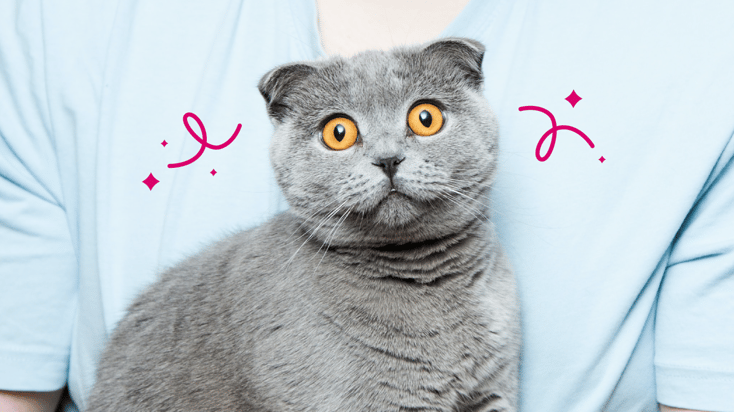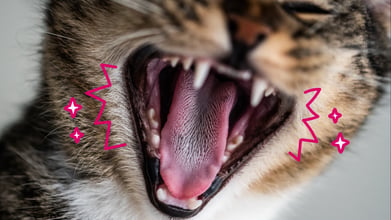How to Help a Cat with Anxiety: 6 Effective Methods

Table of Contents
Have you ever watched your cat jump at the faintest sound or run away and hide when guests come over? It might not be quirky cat behavior; they might be experiencing anxiety.
Just as we sometimes feel on edge in unfamiliar situations or noisy environments, our feline companions have their own triggers. Addressing your cat's anxiety isn't just about comfort; it's important for their overall well-being.
Here's are vet-approved ways to help a cat experiencing anxiety:
1. Recognize the Signs of Anxiety
The first way to understand anxiety in cats is to recognize the common signs. Is your cat grooming excessively or chewing on their fur? Maybe they're tucking their tail often, hiding in unusual spots, or vocalizing more with anxious meows or hisses.
Here's some telltale signs of an anxious cat:
- Pacing restlessly
- Skittish at mild noises
- Avoiding social interactions
- Refusing to use the litter box
- Changes in appetite
- Avoiding their favorite lounging spots
- Showing uncharacteristic aggression
Keeping an eye out for these behaviors is the first step in offering your feline friend the comfort and care they need.
2. Provide Exercise and Enrichment
While physical health is a clear benefit, exercise is equally essential for your cat's mental well-being. Playtime, especially interactive play with toys that mimic prey, can alleviate anxiety by satisfying their natural hunting instincts.
Enrichment activities, such as puzzle toys or treat-dispensing gadgets, keep their minds sharp and engaged. Climbing structures or cat trees offer physical exertion and a high perch, which many cats find calming. These activities create a balanced environment where your cat can feel relaxed and content.
3. Use Pheromone Products
Pheromone products can work wonders for a stressed-out cat. They come in sprays, diffusers, or collars and release a calming scent, like a comforting hug for your feline.
These products can help create a cozy, reassuring space for them, providing comfort, especially during unsettling moments.
4. Train Positive Reinforcement
When your cat behaves calmly or shows curiosity instead of fear towards something that usually makes them anxious, it's a moment worth rewarding.
Give them a treat, some kind words, or a gentle pet to let them know they're on the right track. Over time, this positive reinforcement can help them associate previously stressful situations with good vibes and treats, gradually easing their anxiety.
5. Give Anxiety Medication
Our furry friends may sometimes benefit from prescribed medications to address their anxiety. Specific drugs, like Fluoxetine or Gabapentin, have been found effective for cats when prescribed by a veterinarian.
It's essential to steer clear of administering human medications to cats, as they can be harmful. Always consult your veterinarian before introducing any medication into your cat's routine to ensure their safety and well-being.
6. Create Safe Spaces
Cats benefit from having a dedicated spot they can call their own. This could be a quiet corner, a comfy bed, or a spot near a window.
Make this space better by adding soft bedding, ensuring it's away from loud noises, and possibly elevating it if your cat likes high places. Let them have their quiet time when they're there.
A few toys or catnip can also be added for a bit of fun. It's all about giving them a dependable place to relax when needed.
Your Cat’s Health and Anxiety
It's important to recognize that while many behaviors suggest anxiety, others could indicate underlying health issues.
For instance, a sore tooth could be why they're avoiding food, or a urinary tract issue might be the reason they're not using the litter box.
Along with following our tips, consider booking a behavioral consultation or a wellness checkup with your veterinarian. Seeking veterinary advice will help you get a clearer picture of your cat's situation and ensure they get the right care.
Have Pet Behavior Worries?
Get expert advice for common behavior issues like separation anxiety and health issues due to environmental stress.
Frequently Asked Questions
Does catnip reduce anxiety in cats?
Catnip can make some cats feel more playful and active due to its natural effects. However, it's important to note that not all cats are affected by catnip.
What triggers anxiety in cats?
Loud noises, unfamiliar environments, changes in routine, lack of socialization, new pets or people in the home, and past traumas can all trigger anxiety in cats. Additionally, health issues might also manifest as anxiety-like behaviors.
How do I know if my cat has anxiety?
If your cat frequently flattens their ears, vocalizes excessively, follows you around constantly, shows sudden aggression, or over-grooms to the point of hair loss, these behaviors might indicate anxiety.






